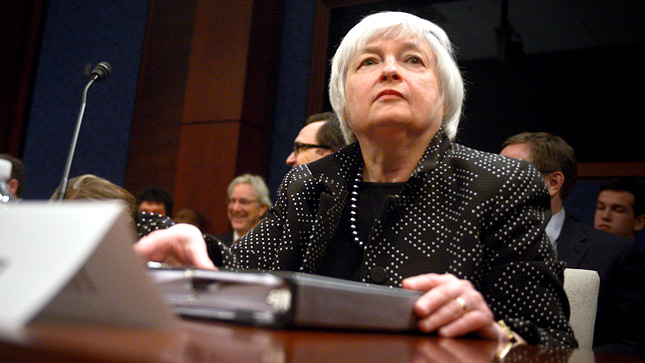Janet Yellen told the markets what they wanted to hear today and the indexes rocketed out of negative territory to finish up over 1 %. As usual, speculation abounds on precisely what was in the minds of investors.
Journalists tend to overstate the causal importance of breaking news when the market makes big moves. Often, those moves were predicted months in advance by serious traders and what happened that day had little to do with what the market did. Not true for the Fed’s announcements. They do move the markets immediately.
What most people don’t know, or at least don’t acknowledge, is that the Federal Reserve really runs the entire economy. When the Fed inflates the supply of money and credit, indexes go up, growth occurs and the economy “improves.” When it deflates the supply of money and credit, indexes go down, contraction occurs and the economy “slows.”
That’s really the whole story of the American economy. Think about that for a moment.
It doesn’t matter who is president, which party controls Congress or what any of those people do or don’t do. Yes, regulations and tax rates have some effect on the economy. Liberals might say more regulation is a good thing, conservatives might say it is bad.
But taxes and regulations haven’t really had much effect at all in the past 40 years. Before that, when taxes were at 90%, they mattered, but not when the top rate fluctuates between 35% and 39%. Do the math. It’s not that significant.
Regulations haven’t changed that much since the New Deal, either. Yes, there was some mild “deregulation” and subsequent “re-regulation.” They caused little bumps and bounces, but nothing compared to the wild swings caused by monetary policy.
In reality, what elected officials have done since 1971, when the U.S. dollar became a completely fiat currency, has had about as much effect on the economy as turning on a blow dryer in a hurricane. Point it with the wind and it makes the wind blow infinitesimally faster. Point it against the wind and it makes the wind blow infinitesimally slower. Either way, the difference is negligible.
Once you understand this, most political narratives about the economy become fairy tales. Liberals credit Bill Clinton with “managing the economy” well during the boom years of the 1990’s. Conservatives say it was that Republican Congress.
Neither Clinton and nor Congress had anything to do with it. They were the blow dryers. The 90’s economy was really just a tech bubble blown up by the Fed with inflation that burst in 2000 when the Fed tightened. Clinton and the Republican Congress were both in office for the whole time. Neither did anything significant to cause the boom or the bust. It was all the Fed.
No one really disputes the Fed’s role. American voters just don’t draw the obvious conclusions. They continue to talk about presidents or Congress as if they significantly affect the economy, when in reality they don’t. At least they don’t anymore.
This couldn’t have been truer than for George W. Bush, who did almost nothing that affected the economy, other than sign Sarbanes-Oxley. Yet, Bush gets credit from Republicans for a “Bush Boom” and blame from Democrats for the housing meltdown.
Those, too, were all the Fed. The Fed blew up the housing bubble with monetary inflation in an attempt to stimulate recovery after its tech bubble burst. It popped the housing bubble it created when it tightened. That’s what caused the Bush Boom and the Bush Bust. Bush himself was just along for the ride.
Now, we have market indexes at an all-time high and an economy that has supposedly “recovered.” As usual, the president takes credit for all of this. If the crash comes on his watch, he’ll take all of the blame. But, like Bush, Obama is just along for the ride. There really is no cause/effect relationship between anything he’s done and what we’re seeing in the Dow or S&P 500 indexes.
We’re we’re really seeing are the results of unprecedented monetary inflation by the Fed, holding interest rates at an unprecedented low (near zero) for an unprecedented period of time (over six years).
That anyone can even comment on the economy without acknowledging the effect of this Fed activity is surreal. For six straight years, it has literally just printed up money and handed it out to banks, acquiring those worthless, mortgage backed securities at face value, even though they couldn’t be sold on the market at any price.
In 2008, the Fed’s balance sheet was $800 billion. It’s now $4.5 trillion. It’s staggering.
Full article: http://www.huffingto … runs-_b_6898658.html
